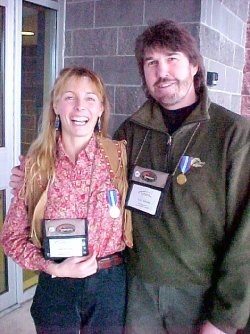SooToday.com received the following letter from Joanie McGuffin regarding an information session about commercial wind power and how the construction of new wind farms will effect our community.
Adventure-paddler, photographer, writer, activist and environmentalist, Joanie along with her husband Gary are internationally recognized for their conservation efforts.
*************************** Commercial wind power is not cheap and it is not green and it is not solving global warming or helping our communities prosper.
For people interested in having a discussion about the massive changes coming to the Algoma region with commercial wind farms, there is going to be a community meeting on Thursday July 29 from 7-9 p.m. at Captain Tilley Park on Hwy 552W Goulais River.
Wind turbines are coming to the Algoma region and the east shore of Lake Superior in a big way.
What might at first appear as a cheap, green solution to our energy needs, in anything but that.
Unbeknownst to most of us, the McGuinty government’s Green Energy Act quietly stripped local governments of their zoning powers.
That means that we, the people of the Algoma region, have had our democracy denied to be involved in the process of establishing these wind farms throughout Algoma.
You might be surprised to learn who voted for silencing our community voice.
Our own provincial representation, Mike Brown, voted in favour of this.
Most people today are aware and concerned about the effects that global warming is having upon our planet.
The massive oil spill in the Gulf of Mexico has further prompted us all to reassess the way we live.
How do we move away from our fossil fuel-dependent society and begin to rely on the natural, renewable forces of nature from the sun, wind and water?
How can anyone be against wind power?
If commercial wind power was really an economical, long-term solution to reduce our dependence on fossil fuels, we should be having serious community discussions to find the best available places to site these wind towers.
However, the big, inconvenient truth about industrial wind is that is not going to solve our problems.
It is making things worse.
- Wind power is not reliable and, therefore must have a constant back-up source of power (most often fossil-fuels) which duplicates rather than replaces our energy consumption. Pollution and CO2 levels are going up, not down.
- For every wind farm that gets built, our electricity costs will continue to go up to cover this hugely subsidized industry.
- Giant wind turbines create enormous impacts on our natural and wild places and on communities where people live. There are hundreds of examples of communities worldwide being negatively impacted by commercial wind farms.
- Living in the vicinity of a wind farm has a number of serious health-related consequences. And there is a significant devaluation of property values.
- Before signing contracts with wind farm companies who wish to locate wind turbines on private property, land owners should get legal counsel, and get educated about the overall impacts to the community.
- Commercial wind turbine requires significant forest clearing, bedrock blasting, road and powerline infrastructure.
- The spectacular ridges of Lake Superior’s east shore and the Algoma region will be covered with red flashing lights if the many hundreds more towers planned are built.
I, along with many people, initially felt excited by the government’s commitment to renewable energy.
As I watched the wind turbines appearing on the horizon in Prince Township from our property in Goulais River, I wanted to believe that we were moving in the right direction.
However evidence from countries with years of commercial wind experience like Demark, Germany and the United Kingdom demonstrate that commercial wind development as a clean, green solution is a fallacy, and we need to have a serious look at the real economic, environmental, and social costs associated with this industry before we inundate one of the most beautiful landscapes on earth with wind turbines.
The answer, my friend, is not blowing in the wind.
From Joanie McGuffin, Goulais River
***************************
